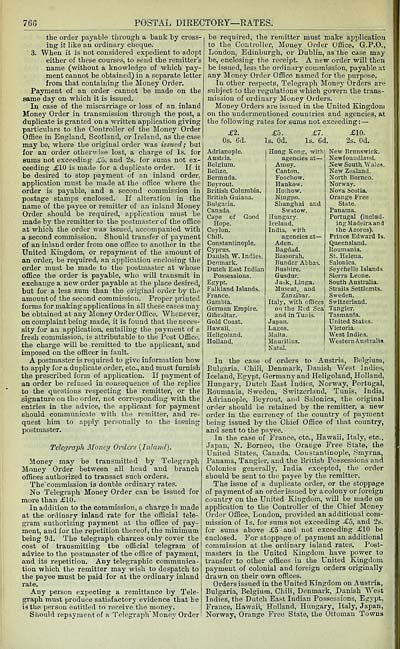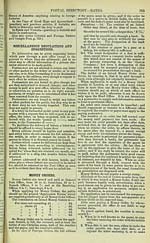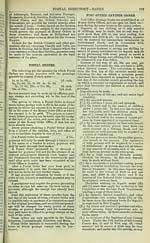Download files
Complete book:
Individual page:
Thumbnail gallery: Grid view | List view

768
POSTAL DIRECTORS— RATES.
the order paj^able through a bank by cross-
ing it like an ordinary cheque.
3. When ib is not considered expedient to adopt
either of these courses, to send the remitter's
name (without a knowledge of which pay-
ment cannot be obtained) in a separate letter
from that containing the Money Order.
Payment of an order cannot be made on the
same day on which it is issued.
In case of the miscarriage or loss of an inland
Money Order in transmission through the post, a
duplicate is granted on a written application giving
particulars to the Controller of the Money Order
Office in England, Scotland, or Ireland, as the case
may be, where the original order was issued ; but
for an order otherwise lost, a charge of Is. for
sums not exceeding X'5, and 2s. for sums not ex-
ceeding £10 is made for a duplicate order. If it
be desired to stop payment of an inland order,
application must be made at the office where the
order is payable, and a second commission in
postage stamps enclosed. If alteration in the
name of the payee or remitter of an inland Money
Order should be required, application must be
made by the remitter to the postmaster of the office
at which the order was issued, accompanied with
a second commission. Should transfer of payment
of an inland order from one office to another in the
United Kingdom, or repayment of the amount of
an order, be required, an application enclosing the
order must be made to the postmaster at whose
office the order is payable, who will transmit in
exchange a new order payable at the place desired,
but for a less sum than the original order by the
amount of the second commission. Proper printed
forms for making applications in all these cases may
be obtained at any Money Order Office. Whenever,
on complaint being made, it is found that the neces-
sity for an application, entailing the payment of a
fresh commission, is attributable to the Post Office,
the charge will be remitted to the applicant, and
imposed on the officer in fault.
A postmaster is required to give information how
to apply for a duplicate order, etc., and must furnish
the prescribed form of application. If payment of
an order be refused in consequence of the replies
to the questions respecting the remitter, or the
signature on the order, not corresponding with the
entries in the advice, the applicant for paj'ment
should communicate with the remitter, and re-
quest him to apply personally to the issuing
postmaster.
Telegraph Money Orders (Inland).
Money may be transmitted by Telegraph
Money Order between all head and branch
offices authorized to transact such orders.
The" commission is double ordinary rates.
No Telegraph Money Order can be issued for
more than £10.
In addition to the commission, a charge is made
at the ordinary inland rate for the official tele-
gram authorizing payment at the office of pay-
ment, and for the repetition thereof, the minimum,
being 9d. The telegraph charges only cover the
cost of transmitting tbe official telegram of
advice to the postmaster of the office of payment,
and its repetition. Any telegraphic communica-
tion which the remitter may wish to despatch to
the payee must be paid for at the ordinary inland
rate.
Any person expecting a remittance by Tele-
graph must produce satisfactory evidence that he
ia the person entitled to receive the money.
Should repayment of a Telegraph' Money Order
be required, the remitter must make application
to the Controller, Money Order Office, G.P.O.,
London, Edinburgh, or Dublin, as the case may
be, enclosing the receipt. A new order will then
be issued, less the ordinary commission, payable at
any Money Order Office named for the purpose.
In other respects, Telegraph Money Orders are
subject to the regulations which govern the trans-
mission of ordinary Money Orders.
Money Orders are issued in the United Kingdom
on the undermentioned countries and agencies, at
the following rates for sums not exceeding: —
In the case of orders to Austria, "Belgium,
Bulgaria, Chili, Denmark, Danish Yv'est Indies,
Iceland, Egypt, Germany and Heligoland, Holland,
Hungary, Dutch East Indies, Norway, Portugal,
Eonmania, Sweden, Switzerland, Tunis, India,
Adrianople, Beyrout, and Salonica, the original
order should be retained by the remitter, a new
order in the currency of the country of payment
being issued by the Chief Office of that country,
and sent to the payee.
In the case of France, etc., Hawaii, Italy, etc.,
.Japan, N. Borneo, the Orange Free State, the
United States, Canada, Constantinople, (-^myrna,
Panama, Tangier, and the British Possessions and
Colonies generally, India excepted, the order
should be sent to the payee by the remitter.
The issue of a duplicate order, or the stoppage
of payment of an order issued by a colony or foreign
country on the United Kingdom, will be made on
application to the Controller of the Chief Money
Order Office, London, provided an additional com-
mission of Is. for sums not exceeding £.5, and 2s.
for sums above £5 and not exceeding £10 be
enclosed. For stoppage of payment an additional
commission at the ordinary inland rates. Post-
masters in the United Kingdom have power to
transfer to other offices in the United Kingdom
payment of colonial and foreign orders originally
drawn on their own offices.
Orders issued in the United Kingdom on Austria,
Bulgaria, Belgium, Chili, Denmark, Danish West
Indies, the Dutch East Indian Possessions, Egypt,
Fi-ance, Hawaii, Holland, Hungary, Italy, Japan,
Norway, Orange Free State, the Ottoman Towns
POSTAL DIRECTORS— RATES.
the order paj^able through a bank by cross-
ing it like an ordinary cheque.
3. When ib is not considered expedient to adopt
either of these courses, to send the remitter's
name (without a knowledge of which pay-
ment cannot be obtained) in a separate letter
from that containing the Money Order.
Payment of an order cannot be made on the
same day on which it is issued.
In case of the miscarriage or loss of an inland
Money Order in transmission through the post, a
duplicate is granted on a written application giving
particulars to the Controller of the Money Order
Office in England, Scotland, or Ireland, as the case
may be, where the original order was issued ; but
for an order otherwise lost, a charge of Is. for
sums not exceeding X'5, and 2s. for sums not ex-
ceeding £10 is made for a duplicate order. If it
be desired to stop payment of an inland order,
application must be made at the office where the
order is payable, and a second commission in
postage stamps enclosed. If alteration in the
name of the payee or remitter of an inland Money
Order should be required, application must be
made by the remitter to the postmaster of the office
at which the order was issued, accompanied with
a second commission. Should transfer of payment
of an inland order from one office to another in the
United Kingdom, or repayment of the amount of
an order, be required, an application enclosing the
order must be made to the postmaster at whose
office the order is payable, who will transmit in
exchange a new order payable at the place desired,
but for a less sum than the original order by the
amount of the second commission. Proper printed
forms for making applications in all these cases may
be obtained at any Money Order Office. Whenever,
on complaint being made, it is found that the neces-
sity for an application, entailing the payment of a
fresh commission, is attributable to the Post Office,
the charge will be remitted to the applicant, and
imposed on the officer in fault.
A postmaster is required to give information how
to apply for a duplicate order, etc., and must furnish
the prescribed form of application. If payment of
an order be refused in consequence of the replies
to the questions respecting the remitter, or the
signature on the order, not corresponding with the
entries in the advice, the applicant for paj'ment
should communicate with the remitter, and re-
quest him to apply personally to the issuing
postmaster.
Telegraph Money Orders (Inland).
Money may be transmitted by Telegraph
Money Order between all head and branch
offices authorized to transact such orders.
The" commission is double ordinary rates.
No Telegraph Money Order can be issued for
more than £10.
In addition to the commission, a charge is made
at the ordinary inland rate for the official tele-
gram authorizing payment at the office of pay-
ment, and for the repetition thereof, the minimum,
being 9d. The telegraph charges only cover the
cost of transmitting tbe official telegram of
advice to the postmaster of the office of payment,
and its repetition. Any telegraphic communica-
tion which the remitter may wish to despatch to
the payee must be paid for at the ordinary inland
rate.
Any person expecting a remittance by Tele-
graph must produce satisfactory evidence that he
ia the person entitled to receive the money.
Should repayment of a Telegraph' Money Order
be required, the remitter must make application
to the Controller, Money Order Office, G.P.O.,
London, Edinburgh, or Dublin, as the case may
be, enclosing the receipt. A new order will then
be issued, less the ordinary commission, payable at
any Money Order Office named for the purpose.
In other respects, Telegraph Money Orders are
subject to the regulations which govern the trans-
mission of ordinary Money Orders.
Money Orders are issued in the United Kingdom
on the undermentioned countries and agencies, at
the following rates for sums not exceeding: —
In the case of orders to Austria, "Belgium,
Bulgaria, Chili, Denmark, Danish Yv'est Indies,
Iceland, Egypt, Germany and Heligoland, Holland,
Hungary, Dutch East Indies, Norway, Portugal,
Eonmania, Sweden, Switzerland, Tunis, India,
Adrianople, Beyrout, and Salonica, the original
order should be retained by the remitter, a new
order in the currency of the country of payment
being issued by the Chief Office of that country,
and sent to the payee.
In the case of France, etc., Hawaii, Italy, etc.,
.Japan, N. Borneo, the Orange Free State, the
United States, Canada, Constantinople, (-^myrna,
Panama, Tangier, and the British Possessions and
Colonies generally, India excepted, the order
should be sent to the payee by the remitter.
The issue of a duplicate order, or the stoppage
of payment of an order issued by a colony or foreign
country on the United Kingdom, will be made on
application to the Controller of the Chief Money
Order Office, London, provided an additional com-
mission of Is. for sums not exceeding £.5, and 2s.
for sums above £5 and not exceeding £10 be
enclosed. For stoppage of payment an additional
commission at the ordinary inland rates. Post-
masters in the United Kingdom have power to
transfer to other offices in the United Kingdom
payment of colonial and foreign orders originally
drawn on their own offices.
Orders issued in the United Kingdom on Austria,
Bulgaria, Belgium, Chili, Denmark, Danish West
Indies, the Dutch East Indian Possessions, Egypt,
Fi-ance, Hawaii, Holland, Hungary, Italy, Japan,
Norway, Orange Free State, the Ottoman Towns
Set display mode to: Large image | Transcription
Images and transcriptions on this page, including medium image downloads, may be used under the Creative Commons Attribution 4.0 International Licence unless otherwise stated. ![]()
| Scottish Post Office Directories > Towns > Edinburgh > Post Office Edinburgh and Leith directory > 1890-1891 > (814) |
|---|
| Permanent URL | https://digital.nls.uk/83518350 |
|---|
| Description | Directories of individual Scottish towns and their suburbs. |
|---|
| Description | Around 700 Scottish directories published annually by the Post Office or private publishers between 1773 and 1911. Most of Scotland covered, with a focus on Edinburgh, Glasgow, Dundee and Aberdeen. Most volumes include a general directory (A-Z by surname), street directory (A-Z by street) and trade directory (A-Z by trade). |
|---|


